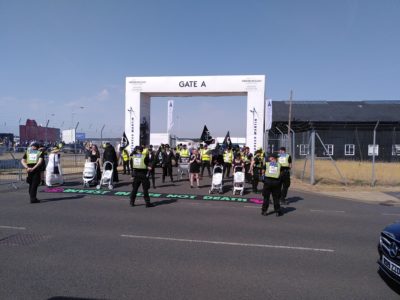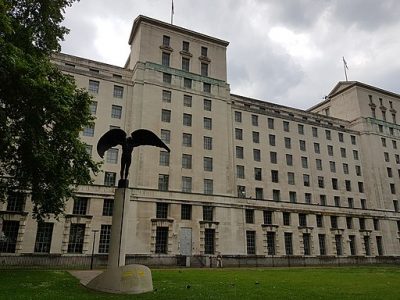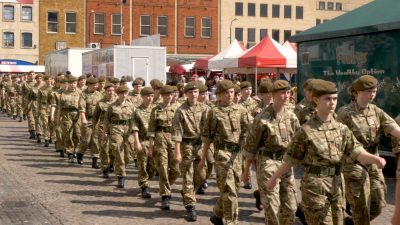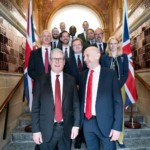Ethics not (military) ethos
ForcesWatch Comment
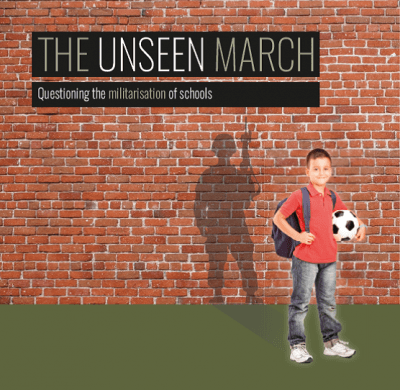
Over the Easter weekend, reports surfaced of proposals to inject schools, particularly those in disadvantaged communities, with a ‘military ethos’. Former education minister Robert Goodwill has been tasked with drawing up a report for the Ministry of Defence (MoD) on the benefits of ‘military ethos’ in schools. Defence Secretary Gavin Williamson has suggested this could include ‘military academies’ in disadvantaged areas.
This is nothing new; similar initiatives have been proposed and developed since 2012. Indeed, we have seen a decade-long promotion of military interests in schools as well as in wider society. While we and others have been monitoring and resisting this, challenging militarist narratives beyond the margins of public debate has proved very difficult. It is vital that mainstream debate starts to challenge military advances into education within an ethics and child rights framework.
The military ethos is the last thing we need in schools. We need children who can think for themselves, not ones who’ll worship conformity. https://t.co/c6ThQ1ZJj3
— Ian Dunt (@IanDunt) April 2, 2018
Ethos refers to the guiding beliefs, standards or ideals of a group or community. It is the origin of the modern word ‘ethics’ which involves evaluating and interrogating what is morally right or wrong. Rather than receiving an ethos from an external institution, schools should have an ethics approach which develops the critical thinking capacities of pupils, and their own ‘ethos’ centred on learning, innovation, creativity and well-being. An overarching and subjective ‘military ethos’ within a school is likely to exclude and alienate some, not least because it presumes agreement with a divisive institution.
If we are going to talk about ethos, we should consider the ethics of the military becoming involved with the education system in order to further its own interests.
Military activities within education are often presented as being motivated by the interests of young people. This is false. Education is not the priority of the MoD. Their interest is to influence ‘future decision-makers’ to support the military and its operations, and to encourage children to enlist. This agenda is clearly evidenced yet the MoD publicly fail to acknowledge it, aware that many will take issue with the education system being used as a tool for military recruitment and promotion.
The furthering of defence interests within education is not appropriate at any time, but is particularly questionable when resources are being stripped from non-military provision and mental health services, education and youth work are not properly funded. It is a horrible irony that those communities most suffering from austerity and longer-term deprivation, therefore the children most vulnerable to long-term mental ill-health related to a military career, are also those targeted with ‘military ethos’.
The military are not the only ones with an ethically concerning interest in education. Where the military operate, the arms industry is not far behind. Dubious companies such as BAE Systems are playing a growing role in the provision of UK education as it becomes increasingly careers and industry led. This is about building their social licence to operate, not opening up their activities to much needed critical thinking; the same applies to the military.
The impact of these agendas on balanced learning must be discussed; from the imperative to ensure balanced learning around political controversial issues, to the level of access to pupils afforded to military interests compared to other public services or employers. Military and arms company activities and ‘military ethos’ are far from ethically and politically neutral. There is a wide range of political and faith-based opinions on war, the military and security, and there needs to be space for these opinions within public institutions.
We should also consider the child rights implications of growing military engagement in education.
Military marketing takes advantage of young people’s vulnerabilities, and it is the youngest recruits, many of whom are enlisted straight from school, who are most at risk during training, deployment, and after they leave. Far from providing a route away from childhood adversity or deprivation, military service can exacerbate its effects later in life or, for the high percentage that leave early, much earlier.
The UN Committee on the Rights of the Child have advocated for over ten years that the UK should cease its recruitment of under-18s into the armed forces, that vulnerable groups are over-represented, and that recruitment materials are inadequate; calls which have been backed by many children’s organisations and rights groups.
In exercising their duty of care towards young people, schools must be aware of the growing number of calls from many quarters to raise the age of recruitment, and ensure that information about the potential dangers of enlisting, particularly enlisting young, is provided alongside the military’s self-promotion.
Targeting kids from disadvantaged areas with military schooling should be raising alarm bells amongst educators and parents. Instead of working towards equality of opportunity and heeding concerns from the UN and child rights groups, the Government are using the education system to embed the military into young people’s lives and exploit those who are particularly disadvantaged for military interests.
The ‘military ethos’ policy raises serious concerns about learning, duty of care, and safeguarding and the moral exploitation of a captive, vulnerable audience by a powerful, self-serving institution. With pressure being applied across government departments to help address the armed forces ‘recruitment crisis’, it is vital from an ethics and child rights perspective that schools are not swept up in this effort and maintain their neutrality.
See more: military in schools/colleges, ethics, military ethos
Like what you read?
> Sign up for our newsletter or blog notifications
> Support our work – from just £2 a month

